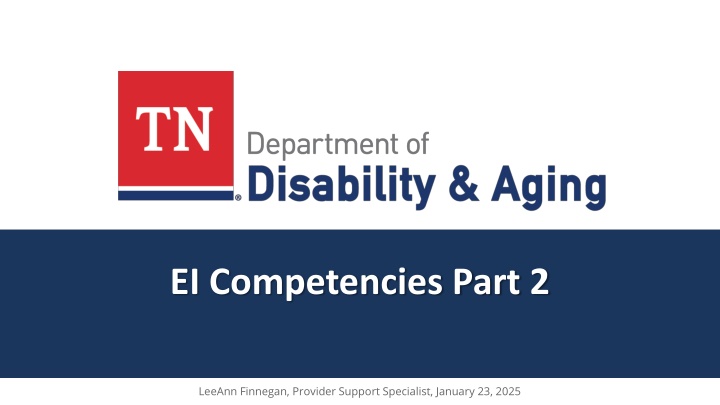
Application Competency in Effective Early Intervention Providers
This article focuses on the application competency of effective Early Intervention providers, emphasizing positive communication exchanges with families. It discusses the components involved in interacting with caregivers, validating their opinions, addressing concerns, and describing the evidence-based approach supporting caregivers in providing embedded learning opportunities. The role of providers in supporting children's learning within everyday routines is also highlighted.
Download Presentation

Please find below an Image/Link to download the presentation.
The content on the website is provided AS IS for your information and personal use only. It may not be sold, licensed, or shared on other websites without obtaining consent from the author. If you encounter any issues during the download, it is possible that the publisher has removed the file from their server.
You are allowed to download the files provided on this website for personal or commercial use, subject to the condition that they are used lawfully. All files are the property of their respective owners.
The content on the website is provided AS IS for your information and personal use only. It may not be sold, licensed, or shared on other websites without obtaining consent from the author.
E N D
Presentation Transcript
EI Competencies Part 2 LeeAnn Finnegan, Provider Support Specialist, January 23, 2025
Check-In FGRBI Application Competencies 1-5 Questions/Wrap Up Agenda
Please share: Please share a highlight of your holiday break!
EI Application Competencies
EI Competencies Two segments: Knowledge Competencies Application Competencies Adults learn through the 3 A s: 1. Acquiring knowledge 2. Assimilating knowledge 3. Applying knowledge
Application Competency 1 Effective EIs should be able to: Facilitate positive and productive communication exchanges with families.
Components of Application Competency 1 Interact with warm, positive regard, and encouragement (e.g., facial expressions, proximity, verbal invitations) to invite caregiver participation. Listen with genuine interest and check for understanding to clarify caregiver s reflection (e.g., active listening, rephrasing). Comment or asks open-ended questions with ample response time (e.g., uses declarative statements, expansions of caregiver comments, reflective questions).
Components of Application Competency 1 Validate the caregiver s opinions and feelings (e.g., empathic listening, affirmations, perspective taking). Address caregiver s questions and concerns by encouraging reflection, joint problem solving, and by sharing information. Reflect upon own opinions and personal values and how those beliefs influence the relationship between the provider, family, and child.
Components of Application Competency 1 Describe the evidence base, purpose, and key components of an early intervention approach that supports caregivers to provide embedded learning opportunities in everyday routines and activities. Demonstrate and provide meaningful examples of the caregiver s role in EI supporting their children s learning.
Application Competency 2 Effective EIs should be able to: Promote family-centered, capacity building, and collaboration practices
Components of Application Competency 2 Develop a trusting and respectful partnership with caregivers in early intervention process. Start with and build on what the family does, enjoys, and believes is important for their family. Promote family and child interactions as primary contexts for learning (e.g., focus on parent-child interactions, involve siblings, provide video clips for grandma to see.
Components of Application Competency 2 Help caregivers figure out ways to use their own resources (formal and informal supports) or access new/different resources or referrals to increase self- efficacy skills for family. Share up-to-date, evidence-based, non-biased parent education/information to support the family s informed decision making. Tailor parenting knowledge and skills messages in ways that are flexible, individualized, and respectful of the caregiver s experiences and expertise.
Components of Application Competency 2 Adjust EI plan in response to and out of respect for the family s concerns, priorities, and changing life circumstances. Notice and comment upon what caregivers are doing to support their child s development to build their competence and confidence.
Application Competency 3 Effective EIs should be able to: Integrate adult learning principles into communication and coaching practices.
Components of Application Competency 3 Connect current discussions and information sharing to prior knowledge and experiences of each adult. Incorporate family history, values, and experiences throughout interactions to help the family see the connections between what they are doing and their child s learning. Introduce developmental information or instructional strategies and provides authentic examples in context using formats preferred by adult.
Components of Application Competency 3 Support/scaffold caregiver s/family s active participation and decision making in relevant activities. Increase or decrease support in response to the caregiver s skill and familiarity with a strategy or routine, ensuring adequate opportunities to practice (e.g., repetition) and maintenance of skill. Encourage caregiver to describe/review the key components of the intervention plan using their own materials, ideas, and sequence with the 5Q or other form of visual model.
Components of Application Competency 3 Use multiple methods of sharing information with the caregiver (written feedback, video reflection, live coaching, etc.) based on their learning preferences. Provide frequent opportunities to assess and self-assess learning including use of video reflection.
Application Competency 4 Effective EIs should be able to: Collaborate to identify everyday routines, activities, and play prioritized by the family.
Components of Application Competency 4 Explain how naturally occurring routines, play, and activities support learning for children and their caregivers throughout the day. Describe the caregiver s role in the routine to support the child s learning, engagement, and participation. Collaboratively identify with caregivers their routines and play that are going well and those that are more difficult to address functional and meaningful learning targets.
Components of Application Competency 4 Collaboratively plan a variety of child and family interest- based activities, play, chores, caregiving, literacy, and social routines with productive roles for the child to learn developmentally sensible skills. Plan with caregivers to ensure opportunities to embed intervention that promotes multiple learning opportunities repeated throughout the day to ensure sufficiency of practice for learning.
Components of Application Competency 4 Brainstorm other routines, activities, and play times for their potential to increase opportunities for learning and generalizing skills that have been acquired. Expand routines and play across types of routines, places, people, and expectations for the child. Problem solve with caregiver on how to make informed decisions on which routines are the most effective and efficient (uses expansions and subroutines to increase/decrease time and opportunities as family needs).
Application Competency 5 Effective EIs should be able to: Embed intervention on functional and meaningful child and family outcomes.
Components of Application Competency 5 Share information on typical child development, learning differences, and disability to guide caregiver s informed decision making on priority outcomes. Support caregivers and other team members to jointly identify developmentally sensible and meaningful and measurable outcomes aligned with family priorities for the child and family. Individualize outcomes, routines, and strategies to match priorities and needs of child and family.
Components of Application Competency 5 Ensure inclusion of measurable, functional criteria to use to review progress toward achieving IFSP outcomes. Use toys, materials, and interactions that promote interest and strengths-based learning. Review and expand the caregiver s understanding of what and how to embed intervention on functional outcomes to support participation in everyday routines. Embed targets and strategies intentionally within identified routines, activities, and play with sufficient repetition for learning.
Components of Application Competency 5 Follow rules for efficiency of embedded intervention by: Embed enough but not too much-just right amount of targets and trials to balance practice opportunities with caregiver time and interest to complete routine. Make the least amount of change in the caregiver s typical routine (maintain sequence) for the maximum impact (increased child opportunities). Use familiar routines to teach new skills and new routines to generalize learning.
Components of Application Competency 5 Incorporate the child s natural/incidental learning opportunities in addition to targeted routines. Identify and implement opportunities to enhance the child s participation in community settings.
References FGRBI Early Intervention (EI) Competencies: http://box5495.temp.domains/~fgrbicom/wp- content/uploads/2020/03/EICompetencies.pdf
Upcoming Meetings January 27, 2025, from 1:00-4:00 Central: EIRA Quarterly Meeting at MTRO, 275 Stewarts Ferry Pike, Nashville February 7, 2025, at 1:00 Central/2:00 Eastern: Directors Meeting (Will continue monthly, except for months with Quarterly Meeting-January, April, July, October)
Upcoming Meetings February 26, 2025, at 11:30 Central/12:30 Eastern: Lunch and Learn February 27, 2025, at 11:30 Central/12:30 Eastern: Coffee Break, wrapping up EI Competencies series February 28, 2025, at 11:30 Central/12:30 Eastern: EI Q&A
Contact Information LeeAnn Finnegan Provider Support Specialist LeeAnn.Finnegan@tn.gov 629-259-3711






















